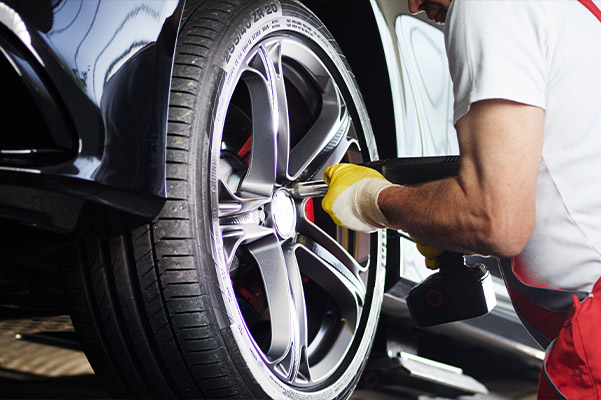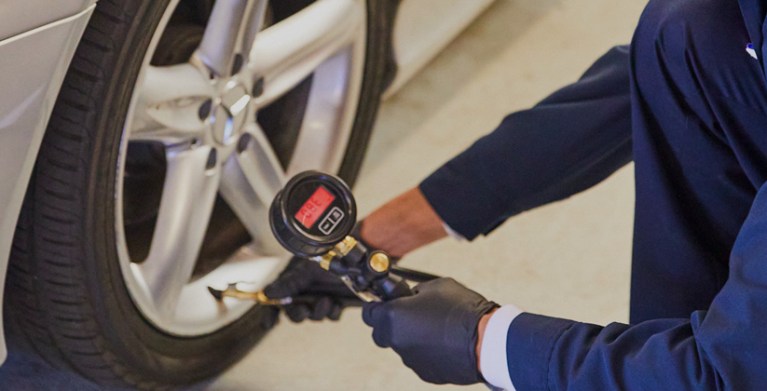Drive with Self-confidence: GMC Tires Service at Morris Tires
Tire Service: The Influence of Climate Condition
When it pertains to ensuring ideal efficiency and security when traveling, comprehending the influence of climate condition on tire solution is essential. From scorching warmth to icy roadways, each weather element can significantly affect tire functionality and general driving experience. By delving into the effects of differing climate problems on tires, chauffeurs can acquire valuable understandings that may improve their automobile's efficiency and longevity. In this conversation, we will certainly discover the complex connection in between climate problems and tire solution, clarifying the importance of weather-specific tire maintenance methods and factors to consider.
Warm and Tire Efficiency
When exposed to heats, tires experience changes in performance that can dramatically affect vehicle security and handling. The heat generated from long term driving or heat conditions causes the tire rubber to soften, bring about reduced step life and raised wear. As the rubber ends up being softer, the tire's grip on the roadway lessens, influencing braking distances and overall grip. In severe situations, extreme warm can even trigger tire blowouts, positioning an extreme safety and security danger to the car and its owners.

Winter Results
Winter conditions can have a significant effect on tire performance and security. As temperatures drop, tire rubber can solidify, bring about reduced traction on icy or snow-covered roads. In winter, tires might additionally lose air pressure much more rapidly, which can influence managing and gas performance. Furthermore, cool temperatures can create tire sidewalls to stiffen, boosting the threat of damages from potholes or various other roadway hazards.
To mitigate the impacts of cool climate on tires, it is critical to consistently check tire stress and inflate them to the manufacturer's recommended degrees. Making use of wintertime or all-season tires created for chilly weather problems can additionally improve traction and hold on icy or snowy roadways. Proper tire upkeep, including normal inspections for wear and damage, ends up being a lot more essential during colder months to guarantee optimal efficiency and safety and security.
Rainy Conditions Effect
Tires with damaged footsteps are more vulnerable to hydroplaning, where a layer of water constructs up between the tire and the roadway surface, leading to loss of traction. To fight this, chauffeurs must frequently inspect their tires for adequate step depth and consider spending in tires especially developed for damp conditions.
Furthermore, wet climate can likewise decrease exposure, making it challenging for vehicle drivers to see the roadway ahead plainly (GMC Tire Service). In such conditions, it is important to adjust driving rates appropriately and maintain a secure following range to enable abrupt quits. Appropriately filled with air tires can also assist in keeping control on wet roads by offering better handling check that and grasp
Snow and Tire Security
When driving in snowy conditions, having the appropriate tires can make a considerable distinction in safety and security and performance. Winter season tires are developed with special rubber compounds and tread patterns to provide much better grip on snow and ice compared to all-season tires.

Furthermore, drivers need to take into consideration installing tire chains in extreme snowy problems. Tire chains provide extra grip by clutching the snow and ice, enhancing security and control. Nevertheless, it is necessary to adhere to manufacturer guidelines when using and setting up tire chains to avoid damages to the tires and automobile. By choosing the best tires, keeping correct inflation, and taking into consideration added traction help like tire chains, chauffeurs can enhance their safety when browsing snow-covered roadways.
Weather-Related Tire Upkeep
When faced with numerous weather condition conditions, proper tire maintenance comes to be an essential facet of automobile security and efficiency. Weather-related Get the facts tire upkeep includes a series of techniques focused on making sure optimal tire feature and longevity in different weather circumstances. One crucial facet of weather-related tire maintenance is tire stress regulation. Varying temperatures can trigger tire pressure to vary, influencing grip and fuel performance. Routinely inspecting and readjusting tire pressure according to manufacturer recommendations is crucial for safe driving in altering weather. Furthermore, tire walk depth plays a substantial duty in dealing with various climate elements. Tires with sufficient walk deepness supply better grip on damp or icy roads, lowering the risk of hydroplaning or skidding. Checking tire walk routinely and changing tires when tread wear reaches a certain deepness is crucial for maintaining grip and stability in damaging weather condition. By prioritizing weather-related tire maintenance, vehicle drivers can boost security, boost car efficiency, and extend the life expectancy of their tires.
Verdict
To conclude, weather have a considerable effect on tire performance and security. From warm influencing tire pressure and put on to winter decreasing grip, it is important to think about the weather condition when maintaining and utilizing tires. Wet conditions can lower grip and lead to hydroplaning, while snow can enhance the risk of crashes if tires are not properly geared up. Weather-related tire upkeep is critical in making certain optimal efficiency and safety and security when traveling.
In this discussion, we will explanation discover the complex relationship in between weather condition problems and tire service, dropping light on the importance of weather-specific tire maintenance methods and factors to consider.
